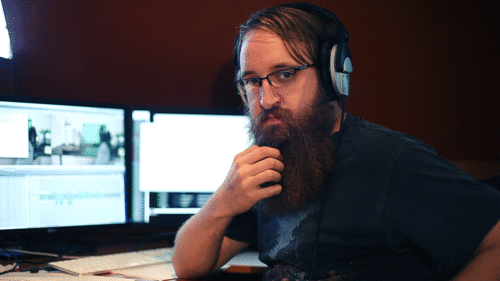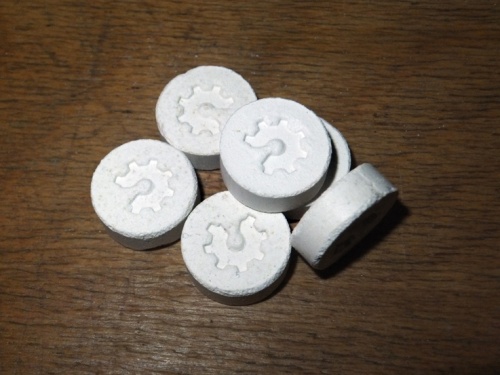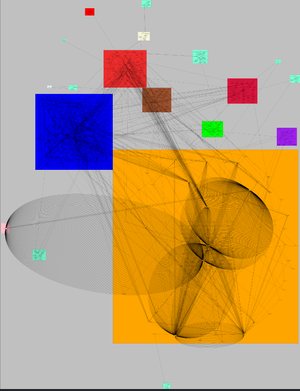User:Roelroscama/R,W&RM3: Difference between revisions
Roelroscama (talk | contribs) |
Roelroscama (talk | contribs) |
||
| (13 intermediate revisions by the same user not shown) | |||
| Line 8: | Line 8: | ||
tactical media | tactical media | ||
autonomy | autonomy | ||
subversion | |||
citizenship | citizenship | ||
playfullness | playfullness | ||
intervention | |||
trolling | trolling | ||
collaboration | collaboration | ||
research | research | ||
in | |||
no | |||
particular | |||
order | |||
| Line 19: | Line 25: | ||
= Descriptions of previous work = | = Descriptions of previous work = | ||
== Open Drugs == | === Open Drugs === | ||
Open Drugs is a database intervention, concluding an investigation into what people might find to be the 'limits' of open-sourcing. If knowledge becomes freely distributed and accessible, at what point do people become uncomfortable? What knowledge should and what knowledge shoudln't be open-sourced? | Open Drugs is a database intervention, concluding an investigation into what people might find to be the 'limits' of open-sourcing. If knowledge becomes freely distributed and accessible, at what point do people become uncomfortable? What knowledge should and what knowledge shoudln't be open-sourced? | ||
| Line 29: | Line 35: | ||
[[File:Od-pills2.jpg | 500px ]] | [[File:Od-pills2.jpg | 500px ]] | ||
== Telewar == | === Telewar === | ||
Telewar is an ongoing research project by The Force of Freedom and Dave Young on the topic of drone warfare. The project was initiated in november 2012 during a three week residency at Upominki in Rotterdam. The result of the residency was a self-published booklet containing an heavily illustrated essay. In it we try to make some sense of the drone warfare phenomenon by looking at how the users of military UAVs represent themselves both officially and unofficially. This is done by examining places, images or artifacts where an official and regulated narrative on drones intersects with with a more spontaneous and uncensored one. Examples include public facebook profiles of UAV squadrons, the online second hand market for drone-related insigna and offical documents conerning the topic. | Telewar is an ongoing research project by The Force of Freedom and Dave Young on the topic of drone warfare. The project was initiated in november 2012 during a three week residency at Upominki in Rotterdam. The result of the residency was a self-published booklet containing an heavily illustrated essay. In it we try to make some sense of the drone warfare phenomenon by looking at how the users of military UAVs represent themselves both officially and unofficially. This is done by examining places, images or artifacts where an official and regulated narrative on drones intersects with with a more spontaneous and uncensored one. Examples include public facebook profiles of UAV squadrons, the online second hand market for drone-related insigna and offical documents conerning the topic. | ||
The latest iteration of the project consists of two film loops. One is a taxonomy of UAV uniform patches. In this film a collection of patches is categorized and classified into four distinct topics, animals, flight hours, mythology and the earth as a grid. By making this taxonomy and studying the symbols for their connotation and their history the viewer gets a better insight in how UAV operators view themselves and the world. The second film is a lexicon of drone terminology. By juxtaposing military jargon with images it tries to scrutinize the pentagon euphemisms that are used to talk about UAVs and the Global War on Terror. | |||
... | http://www.the-force-of-freedom.com/telewar/images/upo3.png | ||
= | === Traceroute mapping === | ||
'' | The traceroute mapping was a research into the political nature of the internet's infrastructure using the so-called traceroute programme, that traces all the different servers one's data passes as one surfs the web. Trough tracingrouting my own browsing history and comparing all the adresses with a GeoIP database I was able to determine through which countries my data was routed. This information was then mapped into diagrams providing me with a very chaotic though insightful picture. | ||
[[File:1_week_browsing.png |thumb| One week of browsing, one of the first visualizations. ]] | |||
= Annotations of Contextualizing Texts = | |||
[[User:Roelroscama/R,W%26RM3/Control_Freedom_Annotation | Control and Freedom by Wendy Hui Kyong Chun]] | |||
= Self-written texts that I find usefull to explain practice = | = Self-written texts that I find usefull to explain practice = | ||
== [http://www.the-force-of-freedom.com/images/The%20Force%20of%20Freedom%20Telewar%202012.pdf Telewar text] == | === [http://www.the-force-of-freedom.com/images/The%20Force%20of%20Freedom%20Telewar%202012.pdf Telewar text] === | ||
= | |||
See [[User:Roelroscama/R,W%26RM3#Telewar | above]] | |||
[ | === [http://pzwart3.wdka.hro.nl/wiki/User:Roelroscama/R,W%26RM2#Web_Dichotomies Web Dichotomies] === | ||
Some notes on the contradictions that manifest itself trough the internet. It's at the same time Empowering/Controlling, WorldWide/American, Public Space/ Market Place, Physical/Cloud. | |||
[ | === [[User:Roelroscama/R,W%26RM3/BC | comment on Bitcoin]] === | ||
a post I made to a discussion on the nettime list | |||
[ | = [[User:Roelroscama/R,W%26RM3/Writing_Machines | Writing Machines]]= | ||
Latest revision as of 08:07, 1 July 2013
Key Themes
systems exploits freedom/control power relations tactical media autonomy subversion citizenship playfullness intervention trolling collaboration research in no particular order
Descriptions of previous work
Open Drugs
Open Drugs is a database intervention, concluding an investigation into what people might find to be the 'limits' of open-sourcing. If knowledge becomes freely distributed and accessible, at what point do people become uncomfortable? What knowledge should and what knowledge shoudln't be open-sourced?
Using recreational synthetic drugs as a case study we wondered if it would be possible to open-source the production process of XTC, and what the effect of that would be. During the investigation we discovered that in practice the same mechanics applied to the creation and improvement of chemical recipes for drugs as they did to to open collaborative software building. The 'code' is shared through online platforms, incrementally improved by users and made available to all in the community. The technology for making these drugs was in fact already open-sourced.
To communicate this fact we added the Open Hardware logo to existing pills and had these tested at several free test labs throughout the country. By having the pills tested they got registered as existing pills on the market, thus Open Drugs officially exists.
Telewar
Telewar is an ongoing research project by The Force of Freedom and Dave Young on the topic of drone warfare. The project was initiated in november 2012 during a three week residency at Upominki in Rotterdam. The result of the residency was a self-published booklet containing an heavily illustrated essay. In it we try to make some sense of the drone warfare phenomenon by looking at how the users of military UAVs represent themselves both officially and unofficially. This is done by examining places, images or artifacts where an official and regulated narrative on drones intersects with with a more spontaneous and uncensored one. Examples include public facebook profiles of UAV squadrons, the online second hand market for drone-related insigna and offical documents conerning the topic.
The latest iteration of the project consists of two film loops. One is a taxonomy of UAV uniform patches. In this film a collection of patches is categorized and classified into four distinct topics, animals, flight hours, mythology and the earth as a grid. By making this taxonomy and studying the symbols for their connotation and their history the viewer gets a better insight in how UAV operators view themselves and the world. The second film is a lexicon of drone terminology. By juxtaposing military jargon with images it tries to scrutinize the pentagon euphemisms that are used to talk about UAVs and the Global War on Terror.

Traceroute mapping
The traceroute mapping was a research into the political nature of the internet's infrastructure using the so-called traceroute programme, that traces all the different servers one's data passes as one surfs the web. Trough tracingrouting my own browsing history and comparing all the adresses with a GeoIP database I was able to determine through which countries my data was routed. This information was then mapped into diagrams providing me with a very chaotic though insightful picture.
Annotations of Contextualizing Texts
Control and Freedom by Wendy Hui Kyong Chun
Self-written texts that I find usefull to explain practice
Telewar text
See above
Web Dichotomies
Some notes on the contradictions that manifest itself trough the internet. It's at the same time Empowering/Controlling, WorldWide/American, Public Space/ Market Place, Physical/Cloud.
comment on Bitcoin
a post I made to a discussion on the nettime list



